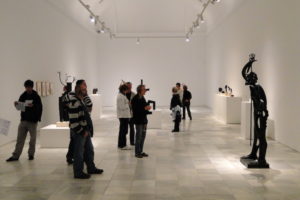From Open Culture: “If we consider such things as art, music, and dance as essential—not only to an education, but to our general well-being—we must commend the UK’s Health Secretary, Matt Hancock, for his ‘social prescribing’ initiative.
Hancock wants ‘the country’s doctors to prescribe therapeutic art- or hobby-based treatments for ailments ranging from dementia to psychosis, lung conditions and mental health issues,’ reports Meilan Solly at Smithsonian. The plan ‘could find patients enrolled in dance classes and singing lessons, or perhaps enjoying a personalized music playlist.’ […]
‘The medical benefits of engaging with the arts are well-recorded,’ Solly writes, citing studies of stroke survivors making great strides after performing with the Royal Philharmonic; dance lessons improving clarity and concentration among those with early psychosis; and those with lung conditions improving with singing lessons. Additionally, many studies have shown the emotional lift museum visits and other cultural activities of a social nature can give. […]
A shift away from ‘over-medicalising’ and toward preventative and holistic approaches has the potential to address not only chronic symptoms of disease, but the non-medical causes—including stress, isolation, and sadness—that contribute to and worsen illness. […]
[…] given all we know about the importance of emotional well-being to physical health, it’s hard to argue with Hancock’s premise. ‘Access to the arts improves people’s mental and physical health,’ he tweeted during his November 6th roll-out of the initiative. ‘It makes us happier and healthier.’ Art is not a luxury, but a necessary ingredient in human flourishing, and yet ‘the arts do not tend to be thought of in medical terms,’ writes professor of health humanities Paul Crawford, though they constitute a ‘shadow health service,’ bringing us a kind of happiness, I’d argue with Confucius, that we simply cannot find anywhere else.”












